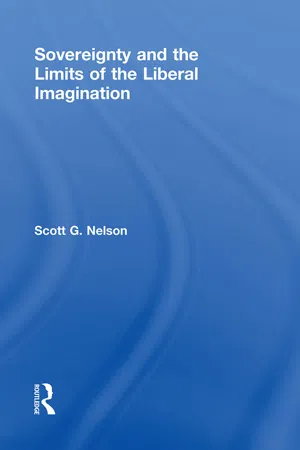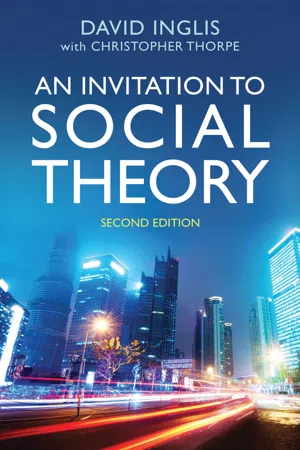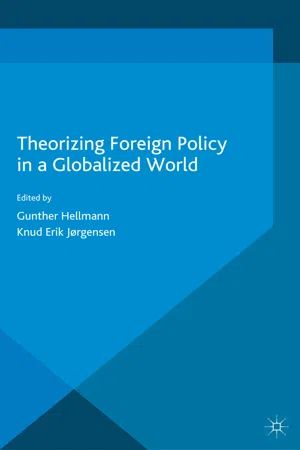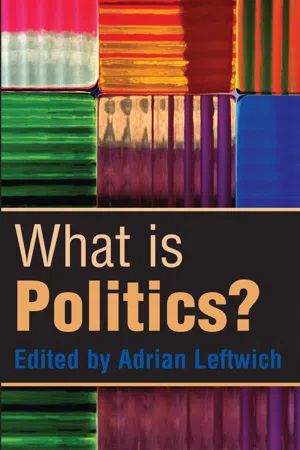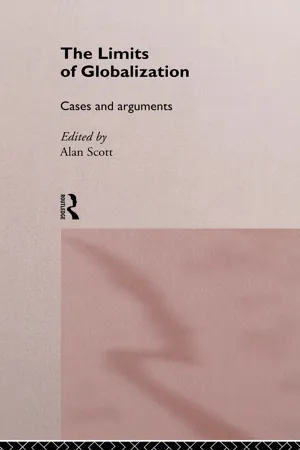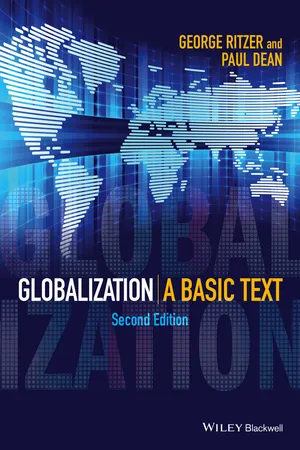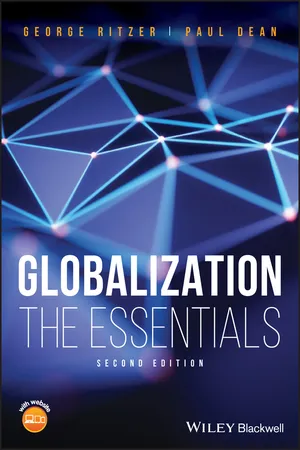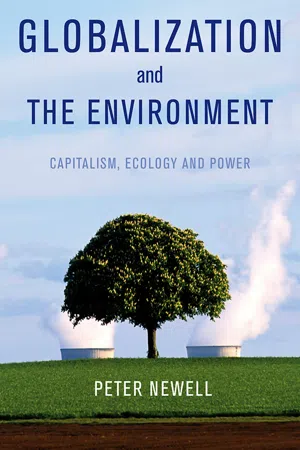Politics & International Relations
Process of Globalisation
The process of globalization refers to the increasing interconnectedness and interdependence of countries and people around the world, driven by advancements in technology, communication, and trade. It involves the flow of goods, services, capital, and ideas across borders, leading to greater economic integration and cultural exchange. Globalization has significant implications for politics, economics, and social dynamics on a global scale.
Written by Perlego with AI-assistance
Related key terms
8 Key excerpts on "Process of Globalisation"
- Scott G Nelson(Author)
- 2009(Publication Date)
- Routledge(Publisher)
3 Political liberalism and international relations Globalization as necessity: a problematization Globalization is a term in wide circulation in the West that variously refers to a process of making One, of inter-linking disparate and once well walled-off spheres of knowledge, labor, production, and distribution. It is a term used by some to denote dramatic reductions in transaction costs on the flows of capital, commodities, labor, services, and information in the networking global economy, the soon-to-emerge globalopolis. It imagines a world which itself may one daydream of a unique nationalism all its own, a world that will have thoroughly transfigured politics and community and, indeed, reconstituted history, progress, and human freedom. The term, in brief, invokes a series of processes inextricably bound to capitalism, liberalism and (late) modernism. Few deny the centrality of these three “-isms” to globalization’s “processes” – indeed, to its very naming. And few deny the power of market liberalization that seems to be everywhere scripting new conceptions of politics and community, solidarity and collective action, autonomy and agency. But the very conditions of capitalism, liberalism and modernity are only vaguely acknowledged as necessary to the processes of globalization – to its naming, yes, but also to ongoing articulations of political community which are producing new ethico-political relations- eBook - ePub
- David Inglis, Christopher Thorpe(Authors)
- 2018(Publication Date)
- Polity(Publisher)
The outcome of all these factors is that even the most dictatorial governments are arguably more constrained in their actions today than they have ever been, both in terms of what they do on the global political stage and how they deal with affairs within what is – theoretically – ‘their own’ national domain. What nowadays counts as ‘inside’ and ‘outside’ a particular state has been problematized by the economic and political dimensions of globalization (Albrow, 1996). Globalization as Social Processes A focus on the social dimensions of globalization involves reflection upon how globalization forces may be involved in the reconstitution of the nature and form of social relations today. Echoing the views of many others, Waters (1995 : 3) defines globalization as a ‘social process in which the constraints of geography on social and cultural arrangements recede and in which people become increasingly aware that they are receding’. This definition usefully highlights the possibility that ‘globalization’ is not just about the ‘world becoming smaller’, but also that people's actions and beliefs are affected and changed precisely because they believe that is indeed the case. Accepting this view of globalization has ramifications for how we can think about the forces that shape and influence people's actions and interactions. We should not see these forces as being either simply ‘local’ or ‘national’ in scale any more, as formed and operating within purely ‘local’ communities or within the boundaries of particular nation-states. This is because both the ‘local’ and the ‘national’ are nowadays bound up with wider, more global-level phenomena and forces (Robertson, 1992 : 37) - eBook - ePub
- Knud Erik Jørgensen, Knud Erik Jørgensen, Kenneth A. Loparo, Knud Erik Jørgensen, Gunther Hellmann(Authors)
- 2015(Publication Date)
- Palgrave Macmillan(Publisher)
2 allowing them to again make sense of the ‘turbulent’ world politics they were observing (Rosenau, 1990; Rosenau and Czempiel, 1992). Since then, global politics and the debate about it have further evolved. Although at times contested (Held and McGrew, 2002, 11–13; Overbeek, 2010), global governance has established itself as an empirical-analytical concept for understanding and studying this evolution (Dingwerth and Pattberg, 2006; Barnett and Sikkink, 2008; Compagnon, 2010).Global governance provides a conceptual answer to the transformation of world politics from a predominantly state-based to an increasingly intricate multi-actor system, which is accentuated by the more recent shift towards multi-polarity and the ongoing proliferation of non-state players at all levels of policy-making. The repercussions these changes have had for foreign policy have however regularly remained under-conceptualized and under-studied. While foreign policy can be considered as an ‘area of enquiry within the discipline of International Relations’ (Alden and Aran, 2012, 1), it has been deplored that foreign policy analysis (FPA) has often not fully engaged with the rest of the discipline of IR (Carlsnaes, 2002, 331; Houghton, 2007, 26). This seems like a paradox if one considers that the premises of IR theories have regularly informed foreign policy concepts and their analysis, with much ‘eclectic borrowing’ notably from (neo-)realism and neoliberalism (but also from other disciplines like social psychology) (Rittberger, 2001; Smith et al., 2008; Alden and Aran, 2012, 112). Yet, systematic work on the ‘general fault-line between the study of foreign policy (looking from the inside out) [ … ] and the study of international relations’ has indeed been scarce (Clark, 1999, 22). The result is that FPA has especially failed ‘to adequately engage with critical intellectual developments in IR over the last two decades’ (Alden and Aran, 2012, 110). One of these intellectual developments is arguably embodied in the concept of global governance. The debate about what global governance may mean for foreign policy and its analysis remains however quite limited.3 - eBook - ePub
What is Politics?
The Activity and its Study
- Adrian Leftwich(Author)
- 2015(Publication Date)
- Polity(Publisher)
Deliberation about the global interest presumes the existence of a wider global community, or communities, and ties of solidarity which transcend borders. In the context of intense global and regional interconnectedness, the very idea of political community as an exclusive territorially delimited unit is problematic. In a world in which global warming connects the long-term fate of many Pacific islands to the driving habits of tens of millions of SUV (Sports Utility Vehicle) motorists across the globe, the conventional territorial conception of political community appears decidedly antiquated. Keohane and Nye trace this complex intermeshing of fates to a heightened ‘institutional velocity’ such that decisions in one location rapidly cascade through global systems with cumulative worldwide effects often magnifying their unintended and adverse consequences (Keohane and Nye, 2000). When the Thai monetary authorities decided to de-link the Thai Baht from the US dollar in July 1997, they could not have predicted that this would trigger the worst financial crisis in East Asia since the great Depression. Globalization weaves together, in highly complex and abstract systems, the fates of households, communities and peoples across regions of the globe such that real ‘communities of fate’ can no longer be defined in exclusively national or territorial terms. As Dryzek concludes, the idea of political community ‘presupposes the notion of a self-contained, self-governing community. However, in today’s world, that notion is becoming increasingly fictional, as political, social, and especially economic transactions transcend national boundaries’ (Dryzek, 1995: 14). This is not to assert that territorial political communities are obsolete, but rather to recognize that they are nested within global, regional and transnational communities of fate, identity, association and solidarity. Growing enmeshment in regional and global orders and the proliferation of trans-border problems has created a plurality of diverse and overlapping collectivities which span borders, binding together directly and indirectly the fate of communities in different locations and regions of the globe. These transnational communities of fate transcend existing political communities such that notions of citizenship, political identity and the public good have escaped their rootedness in the territorially bounded polity. Political community today is being reconfigured to accord with a world of ‘ruptured boundaries’.Global politics
Global politics is a term which seeks to capture this rupturing of boundaries in several significant respects. It acknowledges that the scale of political life has fundamentally altered: politics understood as the organization, distribution, exercise and consequences of power operates simultaneously on different scales from the local to the global neighbourhood. It asserts the growing irrelevance of the distinction between the domestic and the foreign, inside and outside the territorial state, and between the national and the international, as decisions and actions taken in one region impact upon the welfare of communities in distant parts of the globe such that domestic politics is internationalized and world politics becomes domesticated. It accepts that power in the global system is not the sole preserve of states but is distributed (unevenly) amongst a diverse array of public and private actors and networks (from international agencies, through corporations to NGOs) with important consequences for who gets what, how, when and where. It affirms that political authority has been diffused not only upwards to supra-state bodies, such as the European Union, but also downwards to sub-state bodies, such as regional assemblies, and beyond the state to private agencies, such as the International Accounting Standards Committee. It admits that sovereignty remains a principal juridical attribute of states but concludes that it is increasingly exercised as a ‘bargaining chip’ within the global governance complex, rather than as an effective barrier to the globalization of political life. Finally, it affirms that, in an age of globalization, national polities no longer function as closed systems. On the contrary, at the heart of the argument here is that all politics – understood as the pursuit of power, order and justice – is ultimately global politics. - eBook - ePub
- Alan Scott(Author)
- 2013(Publication Date)
- Routledge(Publisher)
1
INTRODUCTION
Globalization: social process or political rhetoric?
Alan ScottThe danger of the rhetoric of globalization is that it reduces the scope of democratic political life to marginal adjustments in the management of market institutions. It thereby closes the political process to questions about the contribution made by market institutions to the satisfaction of human needs…[An effective opposition] must question this model and expose the desolation wrought on communities by policies that have no justification apart from the spurious claim that they are forced on us by an inexorable historical process. In doing so it will assume a responsibility relinquished by contemporary Conservatism—that of ensuring through political action that the workings of market institutions are compatible with the satisfaction of the human need for a life in common.(Guardian , 4 January 1994:18)The new hegemony of the capital markets—and with it new-right pro-market ideas—means the current imperatives are to cut budget deficits, reduce social costs and scale back welfare provision. Worse, all forms of public action are prohibited by the injunction that the private is not only more efficient but also the state has reached the limits of what it can afford to do…The left and liberal conservatives everywhere have a responsibility to keep a different vision of society and economy alive. Taxation, welfare systems and regulation serve the larger cause of social cohesion; and while ideas of public ownership and planning need to be recast, they, too, serve the same cause. Such heresies need to be said aloud and a political tradition preserved. History demands no less.(Guardian , 4 January 1994:13)These two extracts from articles appearing in the same newspaper on the same day are strikingly similar. They express concern that market forces are destroying community and social solidarity The authors criticize the idea that globalization is an unstoppable historical force in the face of which politics is helpless, and they call for a renewal of political projects that can defend society against markets. Both are, in brief, demanding a politics that can resist the subordination of the political and social to the economic. But this consensus is arrived at via quite different political assumptions. - eBook - ePub
Globalization
A Basic Text
- George Ritzer, Paul Dean(Authors)
- 2014(Publication Date)
- Wiley-Blackwell(Publisher)
CHAPTER 5 GLOBAL POLITICAL STRUCTURES AND PROCESSES On Political Processes and Flows The Nation-State Threats to the nation-state In Defense of the Nation-State “Imagined Community” Changes in Global Nation-State Relations Other Global Political Developments and Structures League of Nations United Nations International Atomic Energy Agency (IAEA) Group of Eight Regional Political Organizations Organization of American States (OAS) Association of Southeast Asian Nations (ASEAN) African Union (AU) Global Governance Civil Society International Non-Governmental Organizations (INGOs) INGOs and globalization Chapter Summary The focal concern in this chapter is the political structures 1 involved in globalization. However, these structures, like all structures, are often better seen as processes (and flows) or as encompassing sets of processes. For example, a nation-state or a bureaucracy is often thought of as a structure, but in the main it is the sum of the processes (communication, decision-making, etc.) that take place within it. To put this another way, structures can be seen as “congealed flows.” In that sense, the bulk of this chapter also deals with political processes (and flows). A primary focus of this chapter is to show how the nation-state, and its associated flows and structures, have been transformed within the era of globalization. As global and regional political organizations have emerged, and political processes spill across national borders, the nation-state continues to change in fascinating and unexpected ways - eBook - ePub
Globalization
The Essentials
- George Ritzer, Paul Dean(Authors)
- 2018(Publication Date)
- Wiley-Blackwell(Publisher)
- Nation states can create various international regulatory agencies (e.g. the World Trade Organization [WTO]) to deal with specific economic issues.
- Trade and investment blocs such as the European Union, the North American Free Trade Agreement (NAFTA), the Trans‐Pacific Partnership (TPP), and the Asean Free Trade Area (AFTA ) can govern large economic areas (e.g. North America, the Pacific Rim countries).
- Nations can develop policies to enhance themselves and the ability of their corporations to compete in the global marketplace.
- Regions within nations can integrate economic activities that take place within their borders in order to increase their ability to compete globally and to protect themselves from large shocks that might adversely affect them.
There is some evidence of, and some increasing pressure toward, the emergence of various forms of global governance. James Rosenau (Rosenau 2002 ; Rosenau and Czempiel 1992 ) links this to the increasing “fragmegration” of the global order. This reflects increasing global diversity, as well as the array of contradictory forces that have been unleashed as a result of it. Among those contradictory forces are globalization and localization, centralization and decentralization, and integration and fragmentation (fragmegration).There is a series of more specific factors behind the growth in demand for more global governance. At the top of the list must be the declining power of nation‐states. If states themselves are less able to handle various responsibilities, this leaves open the possibility of the emergence of some form of global governance to fill the void. A second factor is the vast flows of all sorts of things into and often right through the borders of nation‐states. This can involve the flow of digital information of all sorts through the Internet. It is difficult, if not impossible, for a nation‐state to stop such flows, and it is often likely that such action would be politically unpopular and bring much negative reaction. The flow of criminal elements and their products (drugs, laundered money, people bought and sold in sex trafficking, etc.) is a strong factor in the call for global governance. In these cases and others, there is a need for some degree of order, some sort of effective authority, and at least some potential for the improvement of human life. - eBook - ePub
Globalization and the Environment
Capitalism, Ecology and Power
- Pete Newell(Author)
- 2013(Publication Date)
- Polity(Publisher)
Chapter 3The Political Economy of Global Environmental Governance: Power(in) Globalization
We saw in the previous chapters how the relationship between globalization and the environment is first and foremost a political one. It is shaped by decisions and non-decisions, interventions and non-interventions, proactive policy and active neglect on behalf of powerful actors, social forces and classes that together shape the ‘nature’ of globalization. This chapter builds on that general understanding to develop a critical political economy account of global environmental governance in particular. This helps to inform the discussion of the governance of trade, production and finance in the chapters that follow, and provides us with the tools to think about the potential for, and barriers to, effective environmental reform in a context of globalization. I argue that such an approach is able to enhance our comprehension of the practice of environmental governance by emphasizing historical, material and political elements of its (re) constitution and evolution. It is argued that an account of this nature is better placed to address the key questions which drive our enquiry into environmental governance in a context of globalization. These are:• What is to be governed? (and what is not?) • Who governs and who is governed? • How do they govern? • On whose behalf? • With what implications?The first part of the chapter reflects on the insights and limitations of conventional interpretations of environmental governance. The second part articulates the need for a differently grounded approach, driven both by the analytical weaknesses of existing approaches as well as changes in the global system that require more sophisticated and critical approaches to explanation. The third part elucidates the key elements of a political economy approach, assembling diverse theoretical tools towards this end and providing examples of the insights they generate in practice that help to respond to the questions identified above. The chapter concludes with reflections on the benefits that might be derived from such an approach that will inform the rest of the book.
Index pages curate the most relevant extracts from our library of academic textbooks. They’ve been created using an in-house natural language model (NLM), each adding context and meaning to key research topics.
